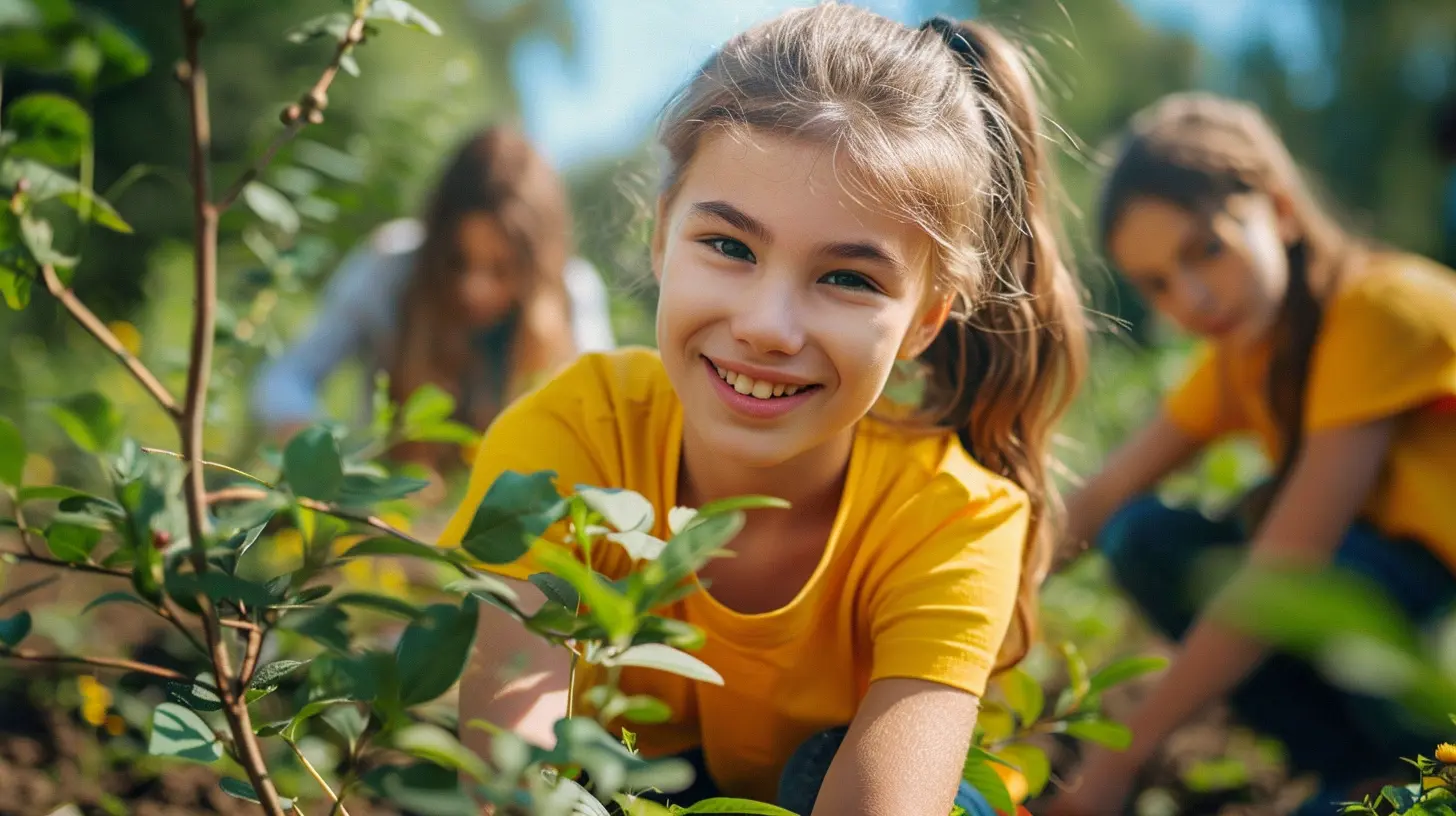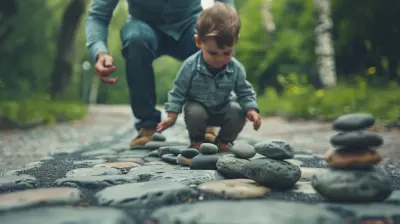20 February 2025
Empathy is one of the most powerful tools we can give our children. It’s the key to understanding others, building strong relationships, and ultimately becoming better human beings. But here's the thing: Teaching empathy doesn't always come from sitting down and having a deep conversation with your kids. You don’t suddenly say, "This is empathy!" and poof—they get it. Empathy is learned through experiences, and one of the most impactful ways to teach empathy is through volunteering as a family.
But wait—there's more! Not only does volunteering help develop empathy in your children, but it also strengthens family bonds in ways you may not have even imagined. Think of it as a win-win: You’re helping others while making your own family unit stronger.
So, let’s talk in-depth about how volunteering as a family can build stronger bonds and provide valuable lessons in empathy. Buckle up!

Why Volunteering Matters: A Heartfelt Experience
Let’s start with the obvious—volunteering is good for the soul. It provides a sense of purpose, enriches our lives, and connects us with those in need. For children, volunteering is a first-hand experience that goes far beyond anything they’d read in a textbook or see on TV.Do you remember the last time you helped someone? Maybe you offered your seat on the bus, or you helped a neighbor carry heavy groceries. How good did it feel afterward? That warm feeling, that sense of fulfillment, is exactly what your family will experience when you join forces to help others.
Now, imagine doing that together as a family. Sharing these moments not only teaches empathy but also creates a deeper connection between family members. It's like building a bridge made of compassion, love, and understanding—a bridge that will stand strong even in the most challenging times.
The Science Behind Empathy and Volunteering
Before we dive into the “how” of family volunteering, let’s nerd out for a second (stay with me—this is interesting!). Numerous studies suggest that people who volunteer experience increased feelings of empathy and compassion. When we engage in volunteer work, our brains release "feel-good chemicals" like oxytocin, which promotes bonding and happiness. The best part? This not only works for adults but for kids too.By regularly volunteering together, you’re laying the groundwork for a more compassionate, emotionally intelligent family. And who wouldn’t want that?

The Benefits of Volunteering as a Family
Let’s break down the specific ways volunteering as a family helps build stronger connections and teaches empathy.1. Shared Experiences Create Lasting Memories
Think about your family’s favorite memories. Maybe it’s a holiday tradition or a summer vacation, right? Now imagine creating memories around impactful, meaningful activities like volunteering at a local shelter or cleaning up a park. These memories are different. They stick. They matter.When you and your kids are side by side, working together with a mutual goal of helping others, it strengthens your bond. It’s the shared experience that brings you closer—teamwork, problem-solving, and connecting over something bigger than yourselves.
Plus, the stories! You’ll have endless stories to tell—about the time you met an inspiring person at the soup kitchen or the pet you helped find a forever home. These are stories that will become part of your family’s narrative, part of your collective experience.
2. Reinforces the Importance of Giving
We live in a world where it's easy to get caught up in the “me, me, me” mentality. Kids especially are bombarded with messages about success, consumerism, and individualism. Volunteering as a family reminds everyone—kids and adults alike—how important it is to give rather than just receive.Volunteering shifts the focus outward, allowing your family to reflect on how giving has inherent value. The simple act of giving time, resources, or effort can transform someone else’s life. When kids witness the impact of their efforts, it reinforces a fundamental principle—that kindness matters.
3. Strengthens Communication and Cooperation
When we volunteer, we often need to work together as a team. Whether it’s organizing donations or planting trees, cooperation and communication are key.These skills naturally translate into deeper family discussions, improved listening, and a more cooperative mindset. Not every family activity fosters these kinds of skills in the same way as volunteering. Playing board games? Sure, it’s fun. But it doesn’t quite have the same effect. Volunteering, on the other hand, opens the door for families to talk more deeply. It stimulates critical conversations about real-world issues like poverty, inequality, and compassion.
4. Developing a Broader Perspective
One of the most powerful lessons that comes from volunteering is the perspective it provides. For kids, especially, it can be eye-opening to interact with people who come from different backgrounds or have different life experiences. Suddenly, your child might understand that not everyone has the same privileges they do—and that not everyone’s problems are the same.For you as a parent, this can be a golden teaching moment. You can help your child ask the tough questions. Why are some people homeless? Why don’t all kids have food to eat? These conversations are uncomfortable at first, but they’re necessary for developing empathy and awareness.
5. Teaches Responsibility and Commitment
Let’s be honest—kids aren’t always the best when it comes to sticking to things, right? Volunteering involves commitment and responsibility. It's essential to show up when you say you will, and that’s a valuable lesson. The dedication required in volunteer work teaches your kids the importance of following through with their commitments, keeping promises, and being reliable.Plus, when your child sees the direct positive impact of their hard work, it creates a sense of accomplishment that fosters a desire to remain committed. It’s a lesson that sticks with them into adulthood.

Ideas for Family Volunteering: Where to Start?
Now that we’ve covered the “why” of family volunteering, let’s talk about the “how.” Lucky for you, there are tons of ways to volunteer as a family, and many don’t require you to travel halfway across the world. Most of these opportunities can be found right in your backyard!Here are a few ideas to get you started:
1. Local Food Banks or Soup Kitchens
Food banks always need volunteers to help sort donations, prepare meals, or serve food to those in need. This can be a wonderful, hands-on way for your family to see the impact of their efforts in real-time.2. Neighborhood Cleanups
A great way to get some exercise and give back is by organizing or participating in a local park or beach cleanup. It’s perfect for families with younger kids, as it’s straightforward and relatively easy to do.3. Animal Shelters
If your family loves animals, why not volunteer at an animal shelter? From walking dogs to cleaning enclosures, there’s no shortage of ways to help. And who doesn’t love bonding over fluffy pups and cute kittens?4. Senior Centers
Older generations have so much to share, and sometimes all they need is a little company. Your family can volunteer to spend time at a senior center, playing games or just chatting with the elderly. It’s an experience that fosters deep empathy and respect for different generations.5. Charity Walks or Runs
Participating in charity runs or walks as a family can be a fun and engaging way to volunteer. You can raise money for causes important to your family—like cancer research, environmental conservation, or support for veterans—while also staying active.6. Community Gardens
If your family enjoys being outdoors, working in a community garden might be an excellent fit. These gardens often provide fresh produce for local food pantries or underserved communities, and they offer a great (and sometimes messy!) hands-on experience for kids.
Overcoming Common Challenges
So, you've read all this and you’re totally on board—but there’s a slight hesitation? That’s okay. Sometimes the idea of family volunteering gets derailed by logistics, time, or even reluctance from the kids.Here’s how to tackle some common hurdles:
- Finding Time: Families are busy—we get it. Start small. Even dedicating just one weekend morning a month can make a huge difference.
- Kids’ Reluctance: Frame volunteering as an adventure. Focus on the fun aspects, like meeting new people, doing hands-on work, or even making an event out of it by grabbing ice cream afterward.
- Age Appropriateness: Certain volunteer activities may not be suitable for younger children. Seek out kid-friendly tasks, or choose flexible opportunities like donation drives, which can be done from home.
Wrapping It All Up: Stronger Bonds Through Shared Acts of Kindness
At the end of the day, volunteering as a family is an unparalleled way to foster empathy, build character, and create lasting connections. When your family engages in acts of kindness together, you aren't just helping others—you’re teaching your children about values that will guide them for life. You’re working together as a team, learning to navigate challenges, and creating beautiful memories in the process.So why wait? Look for opportunities today, and get ready to transform your family dynamic one act of kindness at a time.









Henrietta McClain
Volunteering together truly strengthens family connections and compassion!
March 18, 2025 at 3:24 AM